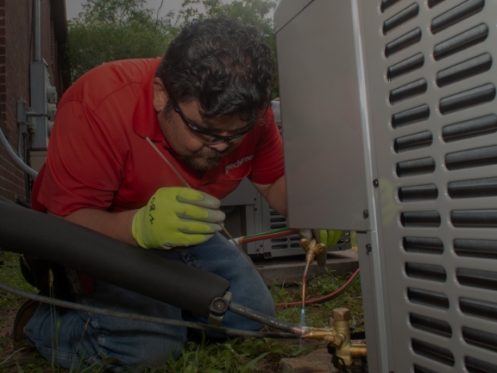Heating and cooling your Gonzales, TX home shouldn’t be disruptive. Although heaters, heat pumps, and ACs are bound to make noise during operation, you should still be able to hold quiet conversations, watch your TV at a reasonable volume, and enjoy deep and restful sleep. If you have a noisy HVAC system, you can use the five strategies that follow to limit its din.
1. Schedule Routine HVAC Maintenance
Nothing promotes quiet and unobtrusive HVAC operation as well as diligent maintenance. Schedule routine maintenance for all HVAC equipment types at least once each year — ideally twice, with an AC tune-up in the spring and a heating tune-up in the fall. During professional service, our HVAC technicians lubricate moving parts, tighten loose components, and check for issues like worn fan belts or bent fan blades.
Multi-point inspection and tune-up services allow for shorter and more efficient heating and cooling cycles, and fewer of them. Thus, even if your equipment still generates a fair amount of sound following routine maintenance, you won’t have to listen to it for as long or as often.
Don’t Forget Your End of the Bargain
Properly maintaining your HVAC system goes beyond scheduling professional maintenance. You should also inspect your HVAC air filter monthly and replace it as needed. For standard filters, the best replacement schedule is every one to three months.
Keep the perimeter of your outdoor condenser unit clear and make sure that all your HVAC air vents are open or partially open. Airflow obstructions at your condenser unit cause operational stress and will make your AC or heat pump work harder and louder. Closing air vents may increase duct pressure and strain the blower, which can contribute to unusual noises and reduced efficiency.
2. Invest in Soundproofing
Find out where the loudest noises are coming from and install an appropriate sound barrier. For instance, if your noisiest HVAC component is your indoor air handler, you could insulate the barrier walls around this component or install a sound blanket. If the majority of your HVAC noise comes from your heat pump or AC condenser, consider adding weatherstripping to nearby windows and installing an acoustic fence.
3. Upgrade Your Older Heater or AC
If you’re cooling your home with an old, inefficient window AC, no amount of maintenance or soundproofing will make your cooling system quieter. Consider upgrading from your outdated window unit to a ductless mini-split system. Mini-split air conditioners and heat pumps offer whisper-quiet indoor operation, often quieter than a normal conversation. While the outdoor unit still produces some sound, it is significantly less disruptive than a traditional system.
Older central HVAC units are noisy as well. The average lifespan of heat pumps, furnaces, and ACs is 15 to 20 years, and efficiency and reliability tend to decline after 10–15 years. Not only do older systems grow noisier, but they also run longer to get their jobs done. New equipment will allow for shorter and more effective heating and cooling cycles and naturally reduced sound. You can also take advantage of innovative technologies that dampen noise, such as variable-speed motors and pre-insulated air handler cabinets.
4. Have Your HVAC Air Ducts Sealed and Insulated or Replaced
A lot of HVAC noise is the result of contraction and expansion within HVAC air ducts. When cold, conditioned air comes blasting through warm metal ductwork, you’ll hear loud popping or banging sounds. Insulating your ductwork will minimize temperature fluctuations and the resulting movements.
Air ducts are also a common source of energy waste in central, forced-air HVAC systems. According to the U.S. Department of Energy (DOE), leaky ducts can lose 20 to 30% of conditioned air, and in some cases losses can reach as high as 40%. With professional duct sealing and insulating, more of the conditioned air your system produces will reach living areas. This reduces both run times and noise.
With proper care, ductwork can last 20 years or more. However, after 15 years many homes experience leaks or inefficiency that make sealing or replacement worthwhile. Replacing older ductwork promotes balanced airflow, eliminates blockages and leaks, and gives you a chance to streamline your system to suit current equipment.
5. Schedule Air Balancing
Changes in the movement of air throughout your ducting and changes in air pressure from your vents can lead to loud whistling or uneven airflow. During air balancing, HVAC technicians strategically adjust duct dampers and vent positions. Air balancing prevents hot and cold spots, optimizes heating and cooling performance, and limits HVAC noise. With optimum airflow, you can enjoy a low, gentle hum.
We offer expert heater and AC maintenance, installation, and repair services. We also provide HVAC air duct installation and replacement services. For help reducing HVAC-related noise in your Gonzales home, get in touch with GVEC Air Conditioning & Heating today!



